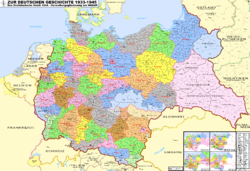- District of Brussels
-
Distrikt Brüssel Gau of Nazi Germany ← 
1944–1945  →
→

Flag Coat of arms Map of Nazi Germany showing its administrative subdivisions, the Gaue and Reichsgaue Capital Brussels Gauleiter - 1944–1945 Joseph Grohé History - Established 1944 - Disestablishment 1945 The District of Brussels (German: Distrikt Brüssel; Flemish: Distrikt Brussel; French: District Bruxelles) was a short-lived administrative polity created by Nazi Germany in 1944. It encompassed the present-day Brussels Capital Region.
History
After its invasion by Germany in June 1940 Belgium was initially placed under a "temporary" military government, in spite of more radical factions within the German government such as the SS urging for the installation of another Nazi civil government as had been done in Norway and the Netherlands.[1] It was joined together with the two French départements of Nord and Pas-de-Calais (included on the grounds that part of this territory belonged to Germanic Flanders, as well as the fact that the entire region formed an integral economic unit[2]) as the Military Administration in Belgium and North France (Militärverwaltung in Belgien und Nordfrankreich).
In spite of this uncompromising attitude at the time, it was decided that the entire area should someday be assimilated into the Third Reich.[3], and divided into three new Reichsgaue of a Greater Germanic Reich: Flandern and Brabant for the Flemish territories, and Wallonien for the Walloon parts.[4] On 12 July 1944, a Reichskommissariat Belgien-Nordfrankreich was established to accomplish precisely this goal, derived from the previous military administration.[5] This step was curiously only taken at the very end of World War II, when Germany's armies were already in full retreat. The new government was already ousted by the Allied advances in Western Europe in September 1944, and the authority of the Belgian government-in-exile was restored. The actual incorporation into the Nazi state of these new provinces therefore only occurred de-jure and with its leaders already in exile in Germany. The only place where any notable gain was made in re-establishing Reich authority occurred in parts of southern Wallonia during the Ardennes Campaign. The collaborators merely achieved a Pyrrhic victory since when the Allied tanks had rolled into Belgium several months before this already signalled the end of their personal domains in the Reich. Many of their supporters fled to Germany where they were conscripted into the Waffen-SS to participate in the final military campaigns of the Third Reich.
In December 1944 Belgium (theoretically including the two French departments) was split up into a Reichsgau Flandern, a Reichsgau Wallonien, and the Distrikt Brüssel, all of which were nominally annexed by the Greater German Reich (therefore excluding the proposed Brabant province).[6] In Flanders the DeVlag party under the leadership of Jef van de Wiele became the sole political party, in Wallonia the Rexist Party under the leadership of Léon Degrelle. The bi-cultural capital of Brussels remained under the direct authority of Reichskommissar Joseph Grohé who served as its effective Gauleiter without actually holding the title. It was proclaimed a "Free City of the Reich", therefore according it the same status as Hamburg, Berlin, and Vienna, cities within Nazi Germany which also had their own Gaus.
See also
- Administrative divisions of Nazi Germany
- Greater Germanic Reich
Notes
- ^ Rich, Norman: Hitler's War Aims: The Establishment of the New Order, page 173. W.W. Norton & Company, Inc., 1974.
- ^ Rich, Norman, page 172.
- ^ Rich, Norman, pp. 171, 196.
- ^ Bernhard Kroener, Rolf-Dieter Müller, Hans Umbreit (2003). Germany and the Second World War: Volume V/II. Oxford University Press, p. 26 [1]
- ^ Rich, Norman, p. 195.
- ^ Lipgens, Walter: Documents on the History of European integration: Volume 1 - Continental Plans for European Integration 1939-1945, page 45. Walter de Gruyter & Co., 1974.
 Administrative divisions of Nazi Germany
Administrative divisions of Nazi GermanyGaue Gau Baden · Gau Bayreuth · Gau Berlin · Gau Düsseldorf · Gau Essen · Gau Franken · Gau Halle-Merseburg · Gau Hamburg · Gau Hessen-Nassau · Gau Köln-Aachen · Gau Kurhessen · Gau Magdeburg-Anhalt · Gau Mainfranken · Gau Mark Brandenburg · Gau Mecklenburg · Gau Moselland · Gau München-Oberbayern · Gau Niederschlesien · Gau Oberschlesien · Gau Ost-Hannover · Gau Ostpreußen · Gau Pommern · Gau Sachsen · Gau Schleswig-Holstein · Gau Schwaben · Gau Südhannover-Braunschweig · Gau Thüringen · Gau Weser-Ems · Gau Westfalen-Nord · Gau Westfalen-Süd · Gau Westmark · Gau Württemberg-HohenzollernReichsgaue Reichsgau Danzig - Westpreußen · Reichsgau Flandern · Reichsgau Kärnten · Reichsgau Niederdonau · Reichsgau Oberdonau · Reichsgau Salzburg · Reichsgau Steiermark · Reichsgau Sudetenland · Reichsgau Tirol-Vorarlberg · Reichsgau Wallonien · Reichsgau Wartheland · Reichsgau WienOperational zones Autonomous regions Other districts Bezirk Bialystok · District of BrusselsRelated topics: Gauleiter · List of Gauleiters Countries occupied by Nazi Germany during World War II Albania • Austria (Anschluss) • Belarus • Belgium • Channel Islands • Czechoslovakia • Denmark • Estonia • France • Greece • Hungary • Italy • Latvia • Lithuania • Luxembourg • Monaco • The Netherlands • Norway • Poland • San Marino • Ukraine • Yugoslavia
Fascism and Nazism in Belgium to 1945 Political parties and groups People Staf De Clercq · Léon Degrelle · Jean Denis · Hendrik Elias · Jef François · Ward Hermans · Paul Hoornaert · René Lagrou · Victor Matthys · Joris Van Severen · Jef van de WieleSee also 5th SS Volunteer Sturmbrigade Wallonien · 6th SS Volunteer Sturmbrigade Langemarck · Algemeene-SS Vlaanderen · Reichsgau Flandern · Reichsgau Wallonien · District of BrusselsCategories:- States and territories established in 1944
- States and territories disestablished in 1945
Wikimedia Foundation. 2010.

